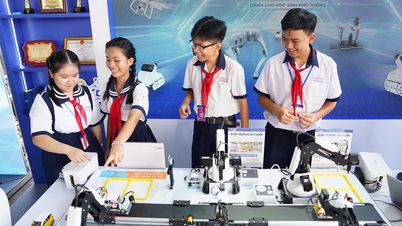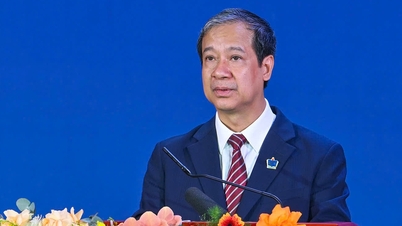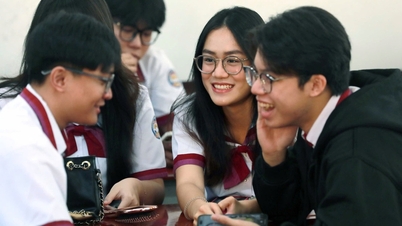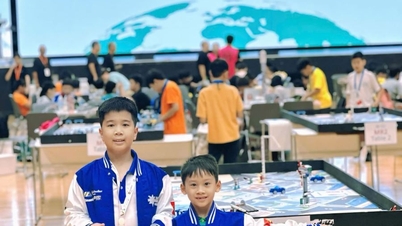The emergence of ChatGPT at the end of 2022 is considered an important milestone, opening a new era in teaching and learning. This technology not only brings many opportunities to access knowledge but also poses challenges for both learners and teachers.
BENEFITS OF AI FOR EDUCATION
For students, AI opens the door to a huge store of knowledge that has been synthesized from many sources. The ability to personalize the learning process helps them shorten the learning time, adjust the content according to their needs and learning style, thereby improving efficiency. AI also provides instant feedback, helping students clearly recognize their strengths and weaknesses, something that traditional methods cannot easily achieve. In addition, students can use AI to summarize documents, consolidate knowledge, and access knowledge more easily, not just depending on the teacher.

Emotional intelligence: understanding, encouragement, and motivation from a teacher is something that AI can hardly replace
PHOTO: DAO NGOC THACH
For teachers, AI is a powerful tool to assist in drafting and supplementing lecture content, updating knowledge, designing teaching activities, assessing and creating illustrations. Many other tasks such as managing records and tracking student progress can be automated by AI. This helps teachers reduce pressure, spend more time on teaching, assessing, guiding and engaging with students.
RISKS AND CHALLENGES FROM WHO
Along with the benefits, AI also has many potential risks. Over-reliance on AI can reduce interaction and close relationships between teachers and students. Without this connection, students’ social skills and personal development will be negatively affected. AI can also make students passive, reducing their creativity and critical thinking.
For teachers, the biggest risk may be an imbalance in the role of teacher. If AI is relied on too much, teachers may be seen as “supervisors” rather than leaders and inspirers.

In a world filled with data and AI tools, students can easily get lost; it is the teachers who guide them, helping them acquire appropriate and correct knowledge.
PHOTO: DAO NGOC THACH
AI can be overused. Students can use AI to do homework without actually learning and practicing skills. Teachers can rely on AI to prepare lesson plans or evaluate students mechanically, lacking empathy and fairness. Lectures created by AI become dry and soulless.
AI also poses ethical risks such as misinformation and cheating in exams, leading to scores that do not reflect true abilities.
N SKILLS TEACHERS NEED TO BE EQUIPPED IN THE AI ERA
According to the 2019 Vietnamese Education Law and the orientation of the Organization for Economic Cooperation and Development (OECD), the fundamental goal of education is to comprehensively develop people: equipping them with solid knowledge, practicing essential skills, forming positive attitudes and fostering human values, thereby helping each individual to be self-reliant, adapt to change and contribute responsibly to society.
With the power of AI, the role of teachers becomes even more important in realizing this goal. Conveying knowledge is perhaps no longer the teacher's number one goal, but rather the guiding role, helping students know how to select, evaluate and apply knowledge in a vast "sea" of information. In a world filled with data and AI tools, students can easily get lost; it is the teacher who guides them, helping them acquire appropriate and correct knowledge.
Teachers today are no longer the only source of knowledge that students can access. Instead, teachers need to focus on developing skills such as critical thinking, creativity, collaboration and problem solving. Assessment methods also need to be innovated: focusing more on the process, not just the results. Forms such as questions and answers, discussions, and group projects will help verify students' true abilities, limiting dependence on AI.
Teachers today need to increase the organization of interactive and experiential activities, play a companion role, inspire motivation and life values. AI should be seen as a support tool, helping to reduce administrative work, so that teachers have more time to focus on teaching and connecting with students. To adapt effectively, teachers need to proactively learn about AI's capabilities, clearly classify what AI does well and what it does not do well, thereby guiding students to use technology for the right purpose, avoiding abuse.
Developing EQ for students is an irreplaceable task of teachers.
In terms of knowledge and thinking (IQ), AI today has surpassed humans in many narrow fields such as chess, and in the future can reach the level of artificial general intelligence (AGI). However, in terms of emotional intelligence (EQ) - including empathy, the ability to regulate emotions, social skills, self-awareness and responsibility, machines cannot yet perform.
Developing EQ for students is an irreplaceable task of teachers. Teachers not only teach knowledge but also inspire, nurture emotions, practice positive attitudes, nurture empathy and social responsibility. These human values can only be acquired through the presence, experience and living example of teachers. AI can convey knowledge quickly and accurately, but "AI cannot teach lessons of the heart".
During my time as a PhD student in the US, I was fortunate to be supervised by a leading professor in the field of software engineering. The most profound thing that remained was not the knowledge but the personality, feelings and the way he treated his students. I still remember one time after many weeks of not seeing him, my research progress was not as expected. I was extremely worried before meeting him because I had nothing significant to report. Contrary to my anxiety, he did not blame me but focused on encouraging me and gently suggesting solutions. After the meeting, not only did my anxiety disappear but I also had more motivation to continue my research.
He always encourages freedom in choosing topics, creates conditions for students to propose ideas and gives insightful comments to adjust the approach. In particular, he always understands the worries and difficulties of students.
It was through these experiences that I realized that emotional intelligence: understanding, encouragement, and motivation from teachers is something that AI can hardly replace. This emotional intelligence cannot be learned from AI or books but through direct interaction between teachers and students.
Source: https://thanhnien.vn/ai-thach-thuc-ca-nguoi-hoc-lan-nguoi-day-185251113155039682.htm























![[Infographic] Schedule of the National High School Excellent Student Exam in 2025](https://vphoto.vietnam.vn/thumb/402x226/vietnam/resource/IMAGE/2025/11/18/1763438886912_training-strategy-2022-2874-5783-jpg.webp)

















![[Photo] General Secretary To Lam and National Assembly Chairman Tran Thanh Man attend the 80th Anniversary of the Traditional Day of the Vietnamese Inspection Sector](https://vphoto.vietnam.vn/thumb/1200x675/vietnam/resource/IMAGE/2025/11/17/1763356362984_a2-bnd-7940-3561-jpg.webp)








































































Comment (0)